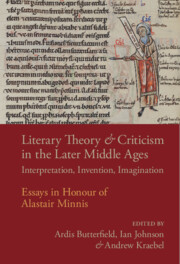Book contents
- Literary Theory and Criticism in the Later Middle Ages
- Literary Theory and Criticism in the Later Middle Ages
- Copyright page
- Contents
- Figures
- Contributors
- Preface and Acknowledgements
- Abbreviations and Conventions
- The Career and Contributions of Alastair Minnis
- Introduction
- Chapter 1 Access through Accessus
- Chapter 2 Scholastic Theory and Vernacular Knowledge
- Chapter 3 Poetics and Biblical Hermeneutics in the Thirteenth Century
- Chapter 4 Robert Holcot and De vetula
- Chapter 5 The Inspired Commentator
- Chapter 6 Guitar Lessons at Blackfriars
- Chapter 7 The Re-cognition of Doctrinal Discourse and Scholastic Literary Theory
- Chapter 8 Arts of Love and Justice
- Chapter 9 The Many Sides of Personification
- Chapter 10 Encountering Vision
- Chapter 11 George Colvile’s Translation of the Consolation of Philosophy
- Chapter 12 When Did the Emotions Become Political?
- Bibliography of the Works of Alastair Minnis
- Bibliography
- Index
Chapter 12 - When Did the Emotions Become Political?
Medieval Origins and Enlightenment Outcomes
Published online by Cambridge University Press: 20 April 2023
- Literary Theory and Criticism in the Later Middle Ages
- Literary Theory and Criticism in the Later Middle Ages
- Copyright page
- Contents
- Figures
- Contributors
- Preface and Acknowledgements
- Abbreviations and Conventions
- The Career and Contributions of Alastair Minnis
- Introduction
- Chapter 1 Access through Accessus
- Chapter 2 Scholastic Theory and Vernacular Knowledge
- Chapter 3 Poetics and Biblical Hermeneutics in the Thirteenth Century
- Chapter 4 Robert Holcot and De vetula
- Chapter 5 The Inspired Commentator
- Chapter 6 Guitar Lessons at Blackfriars
- Chapter 7 The Re-cognition of Doctrinal Discourse and Scholastic Literary Theory
- Chapter 8 Arts of Love and Justice
- Chapter 9 The Many Sides of Personification
- Chapter 10 Encountering Vision
- Chapter 11 George Colvile’s Translation of the Consolation of Philosophy
- Chapter 12 When Did the Emotions Become Political?
- Bibliography of the Works of Alastair Minnis
- Bibliography
- Index
Summary
When did the emotions become political? It would be natural to view a formal political analysis of emotions as a classical phenomenon that was reprised under new and more decisive terms in late humanism and reimagined in the eighteenth century. In such a history we would expect to encounter the work of Thomas Hobbes and Giambattista Vico. It would also be natural to take Hobbes and Vico at their word and read this recovery of the political dimension of emotion as a rejection of medieval philosophy. I will propose the opposite: the grounds for this political turn were laid in late medieval scholasticism. The precedent for humanist and Enlightenment-era political thought about emotion lies with a repudiated scholasticism and its reinvention of classical Greek thought. It is the history of rhetoric that reveals this turn to the political. The thread that links these transformations together is the political reception and re-absorption of Aristotle’s Rhetoric and the modern assimilation of the Rhetoric began in earnest with the most influential statecraft treatise of the Middle Ages, De regimine principum, written about 1277 by the scholastic theologian Giles of Rome.
Keywords
- Type
- Chapter
- Information
- Literary Theory and Criticism in the Later Middle AgesInterpretation, Invention, Imagination, pp. 249 - 268Publisher: Cambridge University PressPrint publication year: 2023

